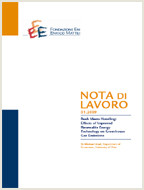Reflections on the Current Debate on How to Link Flood Insurance and Disaster Risk Reduction in the European Union

Data
11.05.2015
11.05.2015
Autori
S. Surminski (The Grantham Research Institute on Climate Change and the Environment – London School of Economics); J.C.J.H. Aerts (Institute for Environmental Studies – VU University Amsterdam); W.J.W. Botzen (Institute for Environmental Studies – VU University Amsterdam); P. Hudson (Institute for Environmental Studies – VU University Amsterdam); J. Mysiak (Fondazione Eni Enrico Mattei, Centro Euro-Mediterraneo sui Cambiamenti Climatici); C. D. Pérez-Blanco (Fondazione Eni Enrico Mattei, Centro Euro-Mediterraneo sui Cambiamenti Climatici)
Codice JEL
Q54, Q58, G22
Q54, Q58, G22
Parole chiave:
Flood Insurance, Disaster Risk Reduction, Europe
Flood Insurance, Disaster Risk Reduction, Europe
Publisher
Climate Change and Sustainable Development
Climate Change and Sustainable Development
Editor
Carlo Carraro
Carlo Carraro
Flood insurance differs widely in scope and form across Europe. Against the backdrop of rising flood losses a debate about the role of EU policy in shaping the future of this compensation tool is led by policy makers and industry. In this paper we investigate if and how current EU policies influence flood insurance. While the question of supply and demand is at the core of the debate, we argue that another key dimension is often overlooked: how to use insurance as a lever for risk reduction and prevention efforts. We investigate if and how current EU policies interplay with these two dimensions and then reflect on the national policy level, by illustrating two conflicting cases of flood insurance: the United Kingdom (UK), where flood insurance provision is widely available, but subject to current reform, and the Netherlands, where efforts to introduce flood insurance have only recently failed. In analysing the current positions on the role of the EU in shaping flood insurance we conclude that there is wide agreement that harmonisation of flood insurance offering across the EU is unlikely to be effective. We conclude that there is clear scope for the EU to play a greater role in linking risk transfer and prevention, beyond existing channels, to ensure an integrated approach to flood risk management across the EU.
***
Suggested citation: Surminski, S., J.C.J.H. Aerts, W.J.W. Botzen, P. Hudson, J. Mysiak, C. D. Pérez-Blanco, (2015), ‘Reflections on the current debate on how to link flood insurance and disaster risk reduction in the European Union’, Nota di Lavoro 41.2015, Milan, Italy: Fondazione Eni Enrico Mattei.
